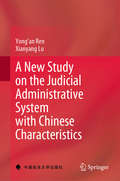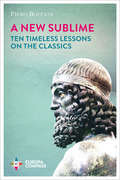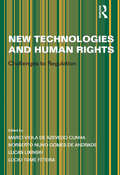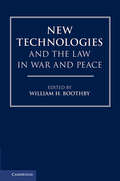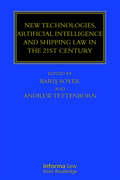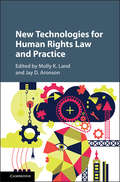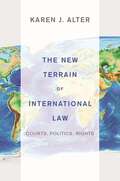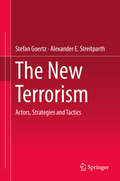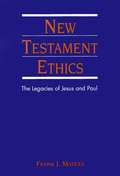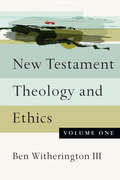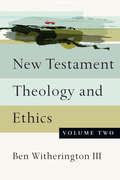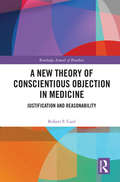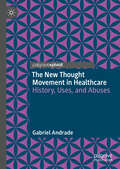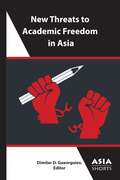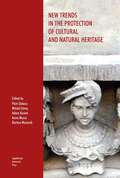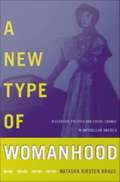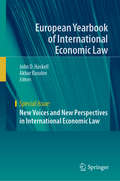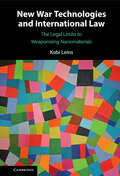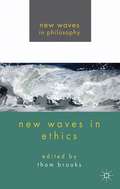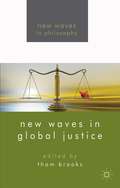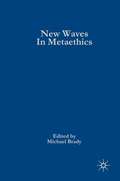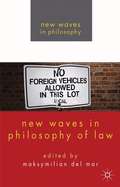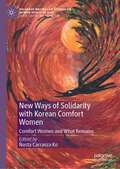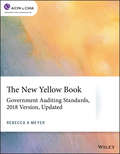- Table View
- List View
New Studies in European History: West Germany, Cold War Europe and the Algerian War
by Von Bülow MathildeAn illuminating and provocative account of Germany's role as sanctuary for Algerian nationalists during their fight for independence from France between 1954 and 1962. The book explores key issues such as the impact of external sanctuaries on French counterinsurgency efforts; the part played by security and intelligence services in efforts to eliminate these sanctuaries; the Algerian War's influence on West German foreign and security policy; and finally, the emergence of West German civic engagement in support of Algeria's independence struggle, which served to shape the newly independent country's perception of its role and place in international society. Mathilde von Bulow sheds new light on the impact of FLN activities, the role of anti-colonial movements and insurgencies in the developing world in shaping the dynamics of the Cold War as well as the manner in which the Algerian War was fought and won.
A New Study on the Judicial Administrative System with Chinese Characteristics
by Yong'an Ren Xianyang LuThis book offers a comprehensive introduction to China’s judicial administration system. It presents in-depth analyses of the country’s current judicial administration system, as well as a new theory on the system that is based on the realities of today’s China, and provides guidance on reform. The book examines the system as a whole, as well as various specific aspects of judicial administration, putting forward bold theoretical proposals for improving China’s judicial administration system and judicial system in general.
A New Sublime: Ten Timeless Lessons on the Classics
by Piero BoitaniIn a book &“as bewitching and entertaining as a novel&” a renowned Italian literary critic &“uncovers the unexpected, extraordinary modernity of the classics&” (Piero Dorfles). In A New Sublime, literary critic Piero Boitani reveals the timeless beauty and wisdom of ancient literature, highlighting its profound and surprising connections to the present. Ranging from Homer to Tacitus, with Thucydides, Aristotle, Sophocles, Cicero, and many others in between, Boitani&’s fresh and inspiring insights remind us of the enduring importance and beauty of the classics of the Western canon. Boitani explores what the classics have to say about the mutability and fluidity of identity and matter, the power and position of women in society. He also looks closely at their depictions of force and subjugation, fate and free will, the ethical life, hospitality, love, compassion, and mysticism. Through it all, he shows how the classics can play active roles in our contemporary lives.
New Technologies and Human Rights: Challenges to Regulation
by Norberto Nuno Andrade Lúcio Tomé FéteiraWhilst advances in biotechnology and information technology have undoubtedly resulted in better quality of life for mankind, they can also bring about global problems. The legal response to the challenges caused by the rapid progress of technological change has been slow and the question of how international human rights should be protected and promoted with respect to science and technology remains unexplored. The contributors to this book explore the political discourse and power relations of technological growth and human rights issues between the Global South and the Global North and uncover the different perspectives of both regions. They investigate the conflict between technology and human rights and the perpetuation of inequality and subjection of the South to the North. With emerging economies such as Brazil playing a major role in trade, investment and financial law, the book examines how human rights are affected in Southern countries and identifies significant challenges to reform in the areas of international law and policy.
New Technologies and the Law in War and Peace
by William H. BoothbyPolicymakers, legislators, scientists, thinkers, military strategists, academics, and all those interested in understanding the future want to know how twenty-first century scientific advance should be regulated in war and peace. This book tries to provide some of the answers. Part I summarises some important elements of the relevant law. In Part II, individual chapters are devoted to cyber capabilities, highly automated and autonomous systems, human enhancement technologies, human degradation techniques, the regulation of nanomaterials, novel naval technologies, outer space, synthetic brain technologies beyond artificial intelligence, and biometrics. The final part of the book notes important synergies that emerge between the different technologies and legal provisions, existing and proposed, assesses notions of convergence and of composition in international law, and provides some concluding remarks. The new technologies, their uses, and their regulation in war and peace are presented to the reader who is invited to draw conclusions.
New Technologies, Artificial Intelligence and Shipping Law in the 21st Century (Maritime and Transport Law Library)
by Bar 305 351 Professor Soyer Andrew TettenbornNew Technologies, Artificial Intelligence and Shipping Law in the 21st Century consists of edited versions of the papers delivered at the Institute of International Shipping and Trade Law’s 14th International Colloquium at Swansea Law School in September 2018. Written by a combination of top academics and highly experienced legal practitioners, these papers have been carefully co-ordinated to give the reader a first-class insight into the issues surrounding new technology and shipping. The book is set out in three parts: Part I offers a detailed and critical analysis of issues that are emerging, and those that are likely to emerge, from the use of advanced computer technology, particularly at the contracting process and in the context of issuing trading documents. Part 2 focusses on artificial intelligence and discusses the contemporary issues that will emerge once autonomous ships and similar crafts are put to use in the world’s oceans. As well as this, the legal impact of ports utilising artificial intelligence and computer technology will also be considered. Part 3 analyses how the increasing use of legal technology is changing insurance underwriting and shipping litigation. An invaluable guide to the recent technological advances in shipping, this book is vital reading for both professional and academic readers.
New Technologies for Human Rights Law and Practice
by Jay D. Aronson Molly K. LandNew technological innovations offer significant opportunities to promote and protect human rights. At the same time, they also pose undeniable risks. In some areas, they may even be changing what we mean by human rights. The fact that new technologies are often privately controlled raises further questions about accountability and transparency and the role of human rights in regulating these actors. This volume – edited by Molly K. Land and Jay D. Aronson – provides an essential roadmap for understanding the relationship between technology and human rights law and practice. It offers cutting-edge analysis and practical strategies in contexts as diverse as autonomous lethal weapons, climate change technology, the Internet and social media, and water meters. This title is also available as Open Access.
The New Terrain of International Law: Courts, Politics, Rights
by Karen J. AlterA compelling new look at the role of today's international courtsIn 1989, when the Cold War ended, there were six permanent international courts. Today there are more than two dozen that have collectively issued over thirty-seven thousand binding legal rulings. The New Terrain of International Law charts the developments and trends in the creation and role of international courts, and explains how the delegation of authority to international judicial institutions influences global and domestic politics.The New Terrain of International Law presents an in-depth look at the scope and powers of international courts operating around the world. Focusing on dispute resolution, enforcement, administrative review, and constitutional review, Karen Alter argues that international courts alter politics by providing legal, symbolic, and leverage resources that shift the political balance in favor of domestic and international actors who prefer policies more consistent with international law objectives. International courts name violations of the law and perhaps specify remedies. Alter explains how this limited power--the power to speak the law--translates into political influence, and she considers eighteen case studies, showing how international courts change state behavior. The case studies, spanning issue areas and regions of the world, collectively elucidate the political factors that often intervene to limit whether or not international courts are invoked and whether international judges dare to demand significant changes in state practices.
The New Terrorism: Actors, Strategies and Tactics
by Stefan Goertz Alexander E. StreitparthIn light of asymmetrical security threats in western democracies as well as in conflict regions, this timely book examines the actors, strategies and tactics of Islamist terrorism and transnational organized crime around the globe. The authors develop an interdisciplinary approach to understanding the ideologies, forms of cooperation, and technological means used in new forms of terrorism. The book starts with an empirical analysis of the new Jihadism as a global Islamist theology and strategy. Furthermore, it investigates the interaction, cooperation and fusion of transnational organized crime and Islamist terrorism and highlights new communication technologies as vital tools for terrorism. Lastly, the book provides an analysis of asymmetrical strategies and tactics used by terrorist organisations, and of low-level terrorism. As such, it will appeal to all political scientists and criminologists studying terrorism, as well as to professionals at various national and international security services.
New Testament Ethics: The Legacies Of Jesus And Paul
by Frank J. MateraNeither Jesus nor Paul developed a formal ethical system, yet each left a moral legacy that forms the core of New Testament ethics. In this book, Frank Matera examines the ethic found in the teachings of Jesus and Paul. He explores the broad range of moral concerns found in these writings and finds an identifiable unity that underlies the ethical teachings of both.
New Testament Theology and Ethics (New Testament Theology And Ethics Ser. #Volume 1)
by Ben Witherington IIIAll too often, argues Ben Witherington, the theology of the New Testament has been divorced from its ethics, leaving as isolated abstractions what are fully integrated, dynamic elements within the New Testament itself. As Witherington stresses, "behavior affects and reinforces or undoes belief." Having completed commentaries on all of the New Testament books, a remarkable feat in itself, Witherington now offers the first of a two-volume set on the theological and ethical thought world of the New Testament. The first volume looks at the individual witnesses, while the second examines the collective witness. The New Testament, says Ben Witherington, is "like a smallish choir. All are singing the same cantata, but each has an individual voice and is singing its own parts and notes. If we fail to pay attention to all the voices in the choir, we do not get the entire effect. . . . If this first volume is about closely analyzing the sheet music left to us by which each musician's part is delineated, the second volume will attempt to re-create what it might have sounded like had they ever gotten together and performed their scores to produce a single masterful cantata." What the New Testament authors have in mind, Witherington contends, is that all believers should be conformed in thought, word and deed to the image of Jesus Christ--the indelible image.
New Testament Theology and Ethics (New Testament Theology and Ethics #Volume 2)
by Ben Witherington IIIAll too often, argues Ben Witherington, the theology of the New Testament has been divorced from its ethics, leaving as isolated abstractions what are fully integrated, dynamic elements within the New Testament itself. As Witherington stresses, "behavior affects and reinforces or undoes belief." Having completed commentaries on all of the New Testament books, a remarkable feat in itself, Witherington now offers the second of a two-volume set on the theological and ethical thought world of the New Testament. The first volume looks at the individual witnesses, while the second examines the collective witness. The New Testament, says Ben Witherington, is "like a smallish choir. All are singing the same cantata, but each has an individual voice and is singing its own parts and notes. If we fail to pay attention to all the voices in the choir, we do not get the entire effect. . . . [If the first volume was] about closely analyzing the sheet music left to us by which each musician's part is delineated, [this second volume attempts] to re-create what it might have sounded like had they ever gotten together and performed their scores to produce a single masterful cantata." What the New Testament authors have in mind, Witherington contends, is that all believers should be conformed in thought, word and deed to the image of Jesus Christ--the indelible image.
A New Theory of Conscientious Objection in Medicine: Justification and Reasonability (Routledge Annals of Bioethics)
by Robert F. CardThis book argues that a conscientiously objecting medical professional should receive an exemption only if the grounds of an objector’s refusal are reasonable. It defends a detailed, contextual account of public reasonability suited for healthcare, which builds from the overarching concept of Rawlsian public reason. The author analyzes the main competing positions and maintains that these other views fail precisely due to their systematic inattention to the grounding reasons behind a conscientious objection; he argues that any such view is plausible to the extent that it mimics the ‘reason-giving requirement’ for conscience objections defended in this work. Only reasonable objections can defeat the prior professional obligation to assign primacy to patient well-being, therefore one who refuses a patient’s request for a legally available, medically indicated, and safe service must be able to explain the grounds of their objection in terms understandable to other citizens within the public institutional structure of medicine. The book further offers a novel policy proposal to deploy the Reasonability View: establishing conscientious objector status in medicine. It concludes that the Reasonability View is a viable and attractive position in this debate. A New Theory of Conscientious Objection in Medicine: Justification and Reasonability will be of interest to researchers and advanced students working in bioethics, medical ethics, and philosophy of medicine, as well as thinkers interested in the intersections between law, medical humanities, and philosophy.
The New Thought Movement in Healthcare: History, Uses, and Abuses
by Gabriel AndradeThis book delves into the evolution of the New Thought Movement and its pervasive influence on modern healthcare. The book begins by tracing the roots of the New Thought Movement, originating in the 19th century, emphasizing the power of the mind in healing and personal development. Over time, this philosophy morphed into the contemporary positive thinking industry, becoming a significant component of Western self-help culture. The book explores how these ideas have become a contentious point in today's culture wars, polarized between supporters who credit it for personal empowerment and critics who highlight its limitations and potential harm. Central to the discussion is an in-depth analysis of the New Thought philosophy's impact on the healthcare industry. While acknowledging the potential benefits, such as motivating patients to adopt healthier lifestyles and fostering a sense of personal agency, the book critically examines how this philosophy's emphasis on mental positivity can lead to victim-blaming. It argues that oversimplifying health issues by attributing them solely to personal mindset obscures the multifaceted reality of health, particularly the significant role of social determinants of health and systemic inequities. This critique underscores how attributing illness to insufficient positive thinking can perpetuate stigma and neglect the socio-economic and environmental factors critical for understanding and addressing health challenges. By offering a nuanced perspective, the book aims to catalyze discussions on integrating mindful optimism with a holistic acknowledgment of the complexities inherent in healthcare, striving for a more balanced and equitable approach
New Threats to Academic Freedom in Asia (Asia Shorts)
by Dimitar D. GueorguievNew Threats to Academic Freedom in Asia examines the increasingly dire state of academic freedom in Asia. Using cross-national data and in-depth case studies, the authors shed light on the multifaceted nature of academic censorship and provide reference points to those working in restrictive academic environments.
New Trends in the Protection of Cultural and Natural Heritage
by Piotr Dobosz, Witold Górny, Adam Kozień, Anna Mazur, Bartosz MazurekThe book entitled New Trends in the Protection of Cultural and Natural Heritage is a collection of twelve scientific articles (chapters) authored by Polish and foreign researchers in the field of cultural heritage protection. Specializing in various scientific disciplines (including legal, architectural, managerial, cultural studies considerations) and at different stages of scientific development, the authors of the individual texts from either a casuistic (case studies) or systemic (studies of normative solutions or development trends) perspective analyze new trends in the protection of cultural and natural heritage.
A New Type of Womanhood: Discursive Politics and Social Change in Antebellum America
by Natasha Kirsten KrausIn A New Type of Womanhood, Natasha Kirsten Kraus retells the history of the 1850s woman's rights movement. She traces how the movement changed society's very conception of "womanhood" in its successful bid for economic rights and rights of contract for married women. Kraus demonstrates that this discursive change was a necessary condition of possibility for U. S. women to be popularly conceived as civil subjects within a Western democracy, and she shows that many rights, including suffrage, followed from the basic right to form legal contracts. She analyzes this new conception of women as legitimate economic actors in relation to antebellum economic and demographic changes as well as changes in the legal structure and social meanings of contract. Enabling Kraus's retelling of the 1850s woman's rights movement is her theory of "structural aporias," which takes the institutional structures of any particular society as fully imbricated with the force of language. Kraus reads the antebellum relations of womanhood, contract, property, the economy, and the nation as a fruitful site for analysis of the interconnected power of language, culture, and the law. She combines poststructural theory, particularly deconstructive approaches to discourse analysis; the political economic history of the antebellum era; and the interpretation of archival documents, including woman's rights speeches, petitions, pamphlets, and convention proceedings, as well as state legislative debates, reports, and constitutional convention proceedings. Arguing that her method provides critical insight not only into social movements and cultural changes of the past but also of the present and future, Kraus concludes A New Type of Womanhood by considering the implications of her theory for contemporary feminist and queer politics.
New Voices and New Perspectives in International Economic Law (European Yearbook of International Economic Law)
by John D. Haskell Akbar RasulovThis book brings together a series of contributions by international legal scholars that explore a range of subjects and themes in the field of international economic law and global economic governance through a variety of methodological and theoretical lenses. It introduces the reader to a number of different ways of constructing and approaching the study of international economic law. The book deals with a series of different theoretical agendas and perspectives ranging from the more traditional (empirical legal studies) to the more alternative (language theory) and it expands the scope of substantive discussion and thematic coverage beyond the usual suspects of international trade, international investment and international finance. While the volume still gives due recognition to the traditional theoretical project of international economic law, it invites the reader to extend the scope of disciplinary imagination to other, less commonly acknowledged questions of global economic governance such as food security, monetary unions, and international economic coercion. In addition to historically-focused and critical perspectives, the volume also includes a number of programmatic and forward-looking explorations, which makes it appealing to a broad audience with a variety of contrasting interests. Therefore, the volume is of particular interest to academics and postgraduate students in the fields of international law, international relations, international political economy, and international history.
New War Technologies and International Law: The Legal Limits to Weaponising Nanomaterials
by Kobi LeinsThe desire for humanity and the desire for security have co-existed as long as humans have been alive. As science has become increasingly sophisticated, so have the methods of self-defence by States. Nanotechnology is already changing warfare by increasing capabilities upon which armed forces are heavily reliant: more efficient energy storage, advanced photovoltaics, and improved military protective equipment to name a few of these developments. Some applications of nanomaterials by the military are both powerful and subtle, and have neurological and biological applications: 'devices that can infiltrate electronics and seize control at crucial moments, artificial 'disease' agents that can rest harmlessly in victims' bodies until activated by an external signal'. The advance of the use or contemplation of use of these types of nanoscale applications by the military requires urgent analysis in light of existing international law, particularly in light of their potential effects on humans and on the environment.
New Waves in Ethics
by Thom BrooksBringing together the leading future figures in ethics broadly construed with essays ranging from metaethics and normative ethics to applied ethics and political philosophy, topics include new work on experimental philosophy, feminism, and global justice incorporating perspectives informed from historical and contemporary approaches alike.
New Waves in Global Justice
by Thom BrooksWith essays ranging from climate change and global poverty to just war and human rights and immigration, leading future figures present an ideal collection for anyone interested in the most important debates in global justice.
New Waves in Metaethics
by Michael BradyMetaethics occupies a central place in analytical philosophy, and the last forty years has seen an upsurge of interest in questions about the nature and practice of morality. This collection presents original and ground-breaking research on metaethical issues from some of the very best of a new generation of philosophers working in this field.
New Waves in Philosophy of Law
by Maksymilian Del MarA collection of 11 cutting-edge essays by leading young scholars, challenging long-held assumptions and offering new research paradigms in Philosophy of Law - in five parts 1) methodology/metatheory; 2) reasoning/evaluating; 3) values/the moral life; 4) institutions/the social life; and 5) the global/international dimension.
New Ways of Solidarity with Korean Comfort Women: Comfort Women and What Remains (Palgrave Macmillan Studies on Human Rights in Asia)
by Ñusta Carranza KoThis book provides a space for victims’ testimonies and memories, engages with their experiences, reflects upon the redress movement, and evaluates policies related to Korean comfort women as victims and survivors from the international, domestic, and bilateral realms. Collectively, this edited volume aims to further diversify the scholarship on comfort women, contribute to the existing literature on social movements related to comfort women and other related studies, and, in doing so, challenge the politicization of comfort women. With this objective, the book presents scholarship from interdisciplinary fields that revisit the meaning of victims’ testimonies, memories, and remembrance, social movement efforts on comfort women, and the related role of government, governance, and society by reflecting on the truths about the historical past. In so doing, it initiates new conversations among political scientists, sociologists, historians, and cultural and literary scholars. What do victims’ testimonies reveal about new ways of imagining historical memory of Korean comfort women? How are memories of comfort women and their experiences remembered in social movements, literature, and cultural practices? Where is the place of comfort women’s experiences in politics, diplomacy, and global affairs? These are some of the questions that guide the contributions to this edited volume, which seek to establish new ways of solidarity with comfort women.
The New Yellow Book: Government Auditing Standards (AICPA)
by Rebecca A. MeyerIt is essential all auditors performing Yellow Book audits understand the recently revised concepts and standards of generally accepted government auditing standards (GAGAS). This book provides a baseline of information for accountants to gain an understanding of the new Yellow Book (2018 revision of Government Auditing Standards). Featuring new guidance related to independence and peer review, this book will increase your knowledge of the requirements and application guidance related to: Ethics Independence Standards for financial audits Attestation engagements Performance audits Key topics covered include: Foundation and principles for the use and application of generally accepted government auditing standards (GAGAS) General requirements for complying with the Yellow Book Ethics, independence, and professional judgment Competence and continuing professional education Quality control and peer review Standards for financial audits Standards for attestation engagements and reviews of financial statements Fieldwork standards for performance audits Reporting standards for performance audits

